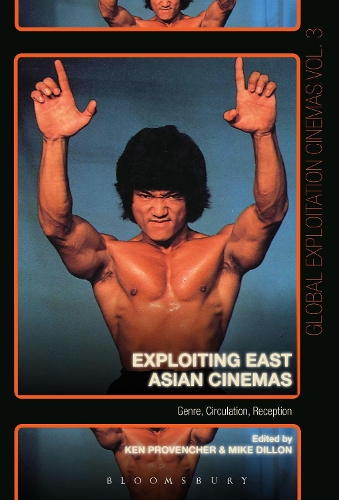
Exploiting East Asian Cinemas: Genre, Circulation, Reception
(Hardback)
Available Formats
Publishing Details
Exploiting East Asian Cinemas: Genre, Circulation, Reception
By (Author) Dr. Ken Provencher
Edited by Dr. Mike Dillon
Bloomsbury Publishing PLC
Bloomsbury Academic USA
11th January 2018
United States
Classifications
Tertiary Education
Non Fiction
Media, entertainment, information and communication industries
History of art
Asian history
791.43095
Physical Properties
Hardback
248
Width 152mm, Height 229mm
499g
Description
From the 1970s onward, exploitation cinema as a concept has circulated inside and outside of East Asian nations and cultures in terms of aesthetics and marketing. However, crucial questions about how global networks of production and circulation alter the identity of an East Asian film as mainstream or as exploitation have yet to be addressed in a comprehensive way. Exploiting East Asian Cinemas serves as the first authoritative guide to the various ways in which contemporary cinema from and about East Asia has trafficked across the somewhat-elusive line between mainstream and exploitation. Focusing on networks of circulation, distribution, and reception, this collection treats the exploitation cinemas of East Asia as mobile texts produced, consumed, and in many ways re-appropriated across national (and hemispheric) boundaries. As the processes of globalization have decoupled products from their nations of origin, transnational taste cultures have declared certain works as art or trash, regardless of how those works are received within their native locales. By charting the routes of circulation of notable films from Japan, China, and South Korea, this anthology contributes to transnationally-accepted formulations of what constitutes East Asian exploitation cinema.
Reviews
This anthology is an excellent contribution to the growing area of transnational and trans-cultural studies in this area. Expertly written by contributors who are well known authorities in this area and well-documented, this proves to be one of the most important anthologies in developing work in this area. Highly recommended. * Tony Williams, Professor/Area Head of Film Studies, English Department, Southern Illinois University at Carbondale, USA, and co-editor with Esther C.M. Yau of Hong Kong Neo-Noir (2017) *
Warning! Handle this book carefully. It contains giant monsters, robot kickboxers and dragons. The world of this book is a sanctuary for the exploitation lover, where the samurai respects critical debates on art vs trash; the serial killer deconstructs the boundaries of East Asian Cinema; and clones of Bruce Lee interrogates stardom. In short, while highly dangerous to the mere mortal, this book is serious (and smart) fun. * Alison Peirse, Lecturer in Writing for Screen and Stage, University of York, UK; Co-editor of Korean Horror Cinema, *
From steampunk Kung Fu to transnational samurais to Mainland mega star to Asia extreme auteurs and to South Korean serial killers, this collection explores the varied ways in which certain East Asian films and filmmakers have been appropriating and appropriated in the globalized networks of production, circulation, and reception. Such an engaging and entertaining read, this definitive collection details the mix of theory, history and practices of East Asian exploitation cinema across a range of national and generic backgrounds, and offers new and insightful ways of understanding East Asian exploitation cinema.' * Chi-Yun Shin, Principal Lecturer in Film Studies, Sheffield Hallam University, UK *
Author Bio
Ken Provencher has taught film and media studies at Josai International University in Tokyo, Japan, and Loyola Marymount University, Los Angeles. His work focuses on the transnational Hollywood industry, especially its relation to East Asian media industries and popular cultures. He has contributed to The Companion to Wong Kar-wai, The Quarterly Review of Film and Video, and The Velvet Light Trap, among others. Mike Dillon teaches film and media studies at California State University, Fullerton. His research focuses on the relationship between media cultures and transnational human mobility. His publications include essays in Journal of South Asian Film and Media Studies, Mediascape, and Reconstruction, among other; and chapters in the anthologies Negative Cosmopolitanisms and Transnational Horror Cinema.
